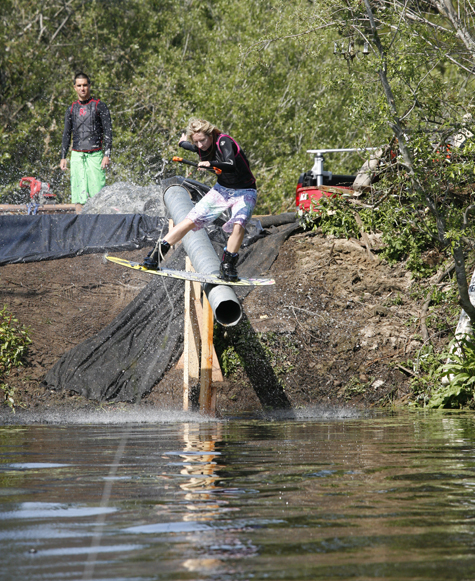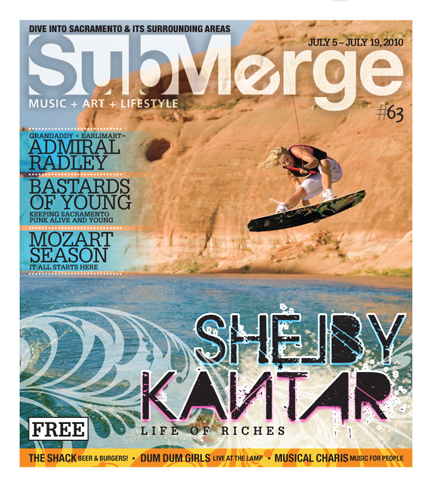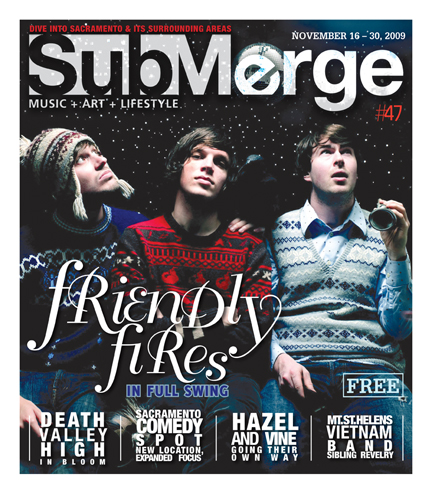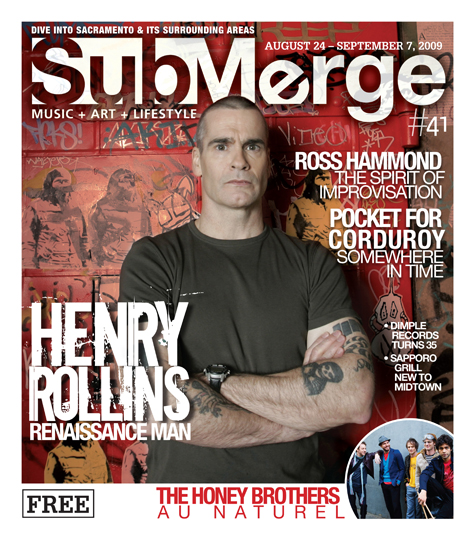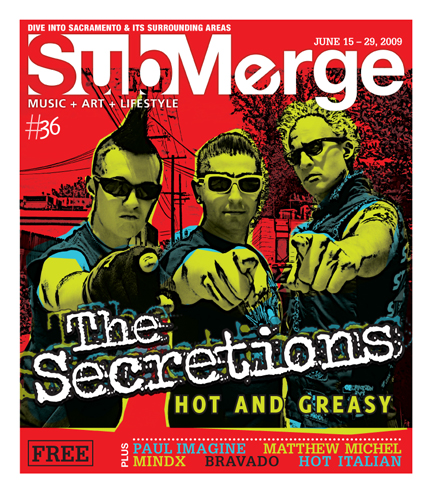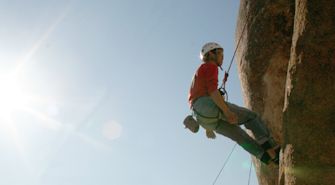
Remember when you were a kid and climbing stuff was the most fun thing ever? Trees, walls, rocks and boulders, people’s houses–you name it, we scaled it. What better way to tap into that inner thrill-seeking child than to take Peak Adventures’ Basic Rock Climbing all-day course on Saturday, May 14? The course is designed for the “adventurous beginner,” according to Peakadventures.org, and will cover all the basics of rock climbing: knot tying, belaying, general equipment use and basic climbing techniques. The $57 fee (it’s cheaper for Sacramento State students or affiliates) includes expert instruction, transportation and all necessary gear. Meet up time is 7 a.m. on May 14 at the Peak Adventures office located on Sacramento State’s campus, and there is also a pre-trip meeting scheduled for Tuesday, May 10 at 6 p.m. For more information or to sign up, call (916) 278-6321 or visit Peakadventures.org.
-J. Carabba
Tag Archives: Sacramento State
Basic Rock Climbing at Cosumnes River Gorge on Saturday, May 14
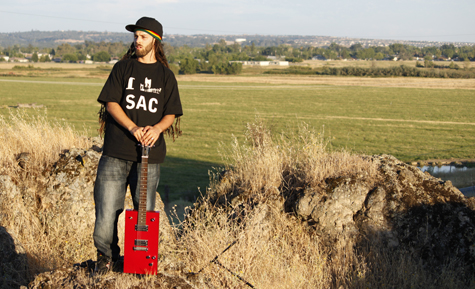
Higher Ground
J*Ras of SouLifted strikes out on his own with City of Trees
At first glance, J*Ras is a tall, friendly and relaxed looking guy with long brown dreadlocks. But after meeting him, you quickly learn he is a hardworking musician who takes on the roles of DJ, singer, rapper, multi-instrumentalist, producer, songwriter, husband and father. The hip-hop and reggae lover from SouLifted who has been in the music industry for more than a decade is ready to unleash his first solo album, City of Trees.
Unlike some mainstream hip-hop and reggae artist, J*Ras wants his music to serve as a call of awareness and individualism to people of all ages in the community.
“You can hear in a lot of the songs the message to be your own individual and keep going against the grain, doing your own thing,” said J*Ras, sitting on a chair in the green music lesson room at the ZuhG Life Store. “But that can also help to give them inspiration to get through things in life.”
When the Sacramento State alum travels and performs, he likes to bring the whole family with him, including his wife, Lady Grace from SouLifted and his two children. Even though his children might be considered youngsters they are already starting to follow in their dad’s footsteps. His 10-year-old son, Chase, is a songwriter and rapper and, according to his father, “tears it up” while performing on stage. His daughter Jossalin is only 2 years old but has to be given her own mini microphone at the live shows or else she will attempt to grab a mic from mom and dad.
“She was singing Bob Marley at a show the other day,” J*Ras said with a smile. “It’s just natural to her.”
On top of traveling with his family, J*Ras is active in the Auburn Hip-hop Congress, a local organization that provides youth with the opportunity and tools to help make a change in their society. At the nonprofit organization, J*Ras acts as the Artist Development Coordinator and works with and teaches young kids creative writing and the history of hip-hop.
“[We’re] working with the kids, giving them what we didn’t have when I was growing up in Auburn and that community, which is an outlet to express your creativity,” J*Ras explained.
Meeting up with him downtown at the ZuhG Life Store seemed like the perfect place to get to know J*Ras, since we were surrounded by music and art by local artists.
Your new album is City of Trees. I’m guessing that it’s about Sacramento?
Yeah, it’s a reference to Sacramento. That’s one of the tracks on the album… It just has to do with Sacramento kind of being overlooked and it’s really a good place to be. I don’t live in Sac right now. I moved to Grass Valley up in the hills. But I was born in Sac, went to Sacramento State, and I got to show love for Sacramento.
You are a very talented guy: a vocalist, a DJ, rapper, producer, basically everything. Did you have all of those roles with your new album?
Yeah, in the new album, I produced the whole album and I play the majority of instruments. There are guests from SouLifted: Brian Fleshman helped to produce some of the tunes, Steven Leonard played some of the guitar and bass. So, we did add some those elements from SouLifted. But I played pretty much everything on all of the tunes, even turntables. [I] do a lot of the vocals, besides some of the backing vocals. And there are some other guests on the album, including Prezident Brown, who is one of my favorite reggae artists, Soulmedic and Jahworks the Revolutionary. We do have a few guests on there but mainly this is just something that I’ve been working on for the last couple of years.
Do you have a certain theme that you are going for in the album, a certain meaning behind the lyrics?
We’ve always carried a positive message in the music. And with SouLifted, we’ve always had the music to lift you up. It’s conscious music with a message. It’s not just about the things that you normally hear in hip-hop music or even reggae. It’s things that you’re going through and how we struggle and how we overcome those things. One of the songs is called “Champ for Life,” and it’s really just a reflection of life and what’s got me here now. It kind of tells a story of where I’m at now. I guess the theme still would be conscious music that does have a message, a positive message for the people.
Do you have a target audience?
What I’ve always liked is that at our shows we always get people dancing. Whether they’re little kids that are 2 years old or the 80-year-old grandmas. And that’s what it’s all about, is getting the people involved. I work with the Auburn Hip-hop Congress as well, and it’s all about trying to help with the youth and giving the youth positive music that they can listen to. Not just the hip-hop that they’re hearing on the radio or the things that are out there easily accessible for them. It’s about giving them something with a message. Mainly our majority of listeners and my majority of listeners are college aged, a little bit of older. But the music is for everyone for sure.
What were some of the challenges working on your solo album–going from a big band to just you?
One of the main challenges is doing it myself and being so critical of my own music. Instead of being able to have that input from everybody to make it that collected thing. But that’s also given me the freedom to make it exactly how I want it. So some of those challenges also become strengths of the album. Mixing and mastering, just some of those fine tuning things, were probably the hardest challenges. It was so hard for me to be happy for where the album was, making it perfect.
What made you want to work on your own album?
I’ve played in multiple bands from Heart Life and Soul to SouLifted. I’ve always written my own music, and I have so many songs that haven’t been recorded because I focus so much energy on the band… I love that collective energy of the people when we unite. It’s just stronger and I love it, so really just kind of realizing where I am now and seeing what I need to put some energy into this solo album so I could really get it out there. I’ve been doing a lot more solo shows myself touring more and just trying to get the music out there. I knew that this was the next logical step in the progression. And having the ability to work with some of these reggae artists and other artists that I aspire to work with on my solo stuff [has] kind helped me push it and get the album out.
Do you see more solo work for your future?
Absolutely, we have a lot of projects going on, which is great and we are doing a lot of collaborations. Right now, I’m working on an album with Soulmedic and a lot of music with him. He is a great reggae artist out of the Nevada City area and Hawaii–he is kind of half and half. I’m also doing a tour with some of the artists from Thizz Nation, which is kind of funny, because it’s totally anti what our music is about. But they’re trying to bring that consciousness and educate some of the people and their audience. We got to try and reach every target audience we can. So, I’ll definitely be pretty busy doing some solo work, but I also hope to include some more SouLifted shows. And doing a lot of collaborations with artists, a lot of hip-hop artists in Sacramento and working with the Auburn Hip-Hop Congress right now a lot too.
I’ve read that you have been performing since 1999… over 10 years!
Yeah, that’s when I actually threw my first show. I was 15 years old and I got approached because we had been doing parties, where we just pull out in the woods and set up our turntables and generator. And so the word got out. We had a little hip-hop crew when I was still in high school and one of the local bars actually asked us to throw a show and that was in May in 1999. That was the first show that I threw myself, made the flier and all that, cutting stuff out, old school. It’s come a long way since then and we put a lot into it. I’m real happy with where I’m at now and where it’s moving along.
What is the best part of performing live?
The energy from the people. Just the feeling that I get from performing, it’s not like anything else. I know I’m meant to be doing that when I’m up there… And I love getting the people involved and the energy and getting that love back from all of the love that you put into the music.
J*Ras will celebrate the release of his solo album City of Trees at Sol Collective on April 29, 2011. Lady Grace, Task1ne and many others will also be on-hand. Expect special guests and some big surprises. The show is all-ages and gets underway at 8 p.m.
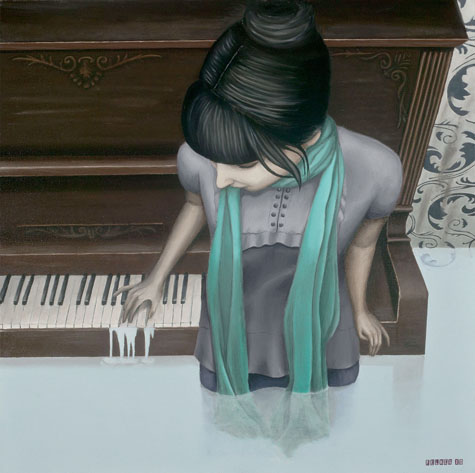
Conversations With Whitman
Artist Jeffery Felker puts his appreciation for Walt Whitman on Canvas
Literature majors, by nature and necessity, are fixated on written language. Jeffery Felker would appear to be no different. He holds a master’s degree in English literature from Sacramento State, where he also completed his undergraduate studies, and currently works as a part-time adjunct English professor at American River College. It should follow that in his free time, Felker is most likely hunched over a keyboard (perhaps an old manual typewriter, if you’re a romantic), meticulously writing well into the wee hours with designs on authoring the Great American Novel. However, that’s not the case. For Felker, the brush has won out over the pen as his tool of choice in forging his artistic vision.
“I do write, just not that often,” Felker, a Sacramento native, admits. “It’s something more like, hey, I’m in the mood. I’ll do it. But that’s as far as I’ll go with writing.”
Felker earned a minor in art studio while an undergrad at Sacramento State, and it’s served him well. His latest series, The Poetics of Music at Sea, contains 16 pieces (11 paintings and five drawings), and recently opened at the Union Gallery on Sacramento State campus on Oct. 4, 2010. It’s a solo show, and his first at the Union, as well as his first solo show in a couple of years. Felker says he was pleased with the opening, which he estimates drew 60 to 80 patrons–certainly a respectable welcome from his alma mater. However, the humor of debuting his latest series of paintings at the school from which he holds a master’s in literature is not lost on him.
“It was kind of weird,” Felker says. “I got my BA and master’s there, so it was like, ‘Shouldn’t I be coming back for a dissertation on an English thesis?’ It’s kind of ironic, right? I didn’t major in art there, and yet I’m showing there. It was kind of funny.”
While his creative focus is on his visual art, Felker has not abandoned his literary background. The Poetics of Music at Sea is inspired by the writings of the great American poet Walt Whitman. The titles for the pieces in the series were taken from lines from Whitman’s poems. Originally, the series was meant to encompass the work of several different poets, but Felker decided paring the number down to just one would deliver a more “powerful message.”
“It had been a year since I’d actually reinvested time in English and literature, because I was spending so much time prepping for my classes,” Felker says of his decision to focus solely on Whitman’s work for The Poetics of Music at Sea. “I re-found my desire for that kind of literature. I was really digging his stuff. I found so many great quotes, it was like, this guy really spoke to me.”
The Poetics of Music at Sea will show at the Union Gallery now through Nov. 4, 2010. Felker has a couple of group shows on the horizon that will take place in Southern California early 2011–one in Venice and the other in Anaheim, which will have a “circus theme.” He says he’s also planning to co-curate a show with his friend Glenn Arthur from Orange County, Calif. Felker says he has four artists other than himself already lined up and that the show will be “a revitalization of fairy tales” that will take familiar stories re-appropriated by a certain Mouse for mass consumption back to their darker roots. He hopes the show will debut in early 2012. In the following interview, Felker clues Submerge in on his background and the thought process behind his current series of paintings.
The name of your current exhibit is The Poetics of Music at Sea. I thought it was interesting that you used sea imagery in the title, but Sacramento is sort of a landlocked, valley city.
It’s sort of iconic, the sea. There’s a lot of association with the sea in English, at least in my background in English. My concentration was in 19th Century literature. Seafaring was sort of a popular topic in the Victorian era.
The main connection there is with Walt Whitman. The sea is an image, at least for Whitman; water imagery in and of itself is an ode to the power, the birth that water can bring. He was very into earthy things and nature, and he was always commenting on those things in his poetry. I’m kind of concentrating on water as an opposite, as more of a negative.
When did you discover Whitman? Was it through your studies or was he a writer you connected with prior to your time as an English lit major?
I’d heard about Whitman. I’d read a few of his poems, but it wasn’t until my undergrad work, where I was really required to dig into his poetry, that I got really connected to what he was talking about.
Was there a poem in particular that really clicked for you?
Probably “I Sing the Body Electric.” I had to read so much of it, you know what I mean? [Laughs] When you look at Leaves of Grass, there are parts of it that kind of stick out. That’s what I was going with here, too, these specific elements that were speaking to me as far as visually.

But As For Me, For You, The Irresistible Sea Is To Separate Us, 15” x 19,” Oil On Board, 2010
You said that you’re using water as a sort of negative in this series of paintings, whereas Whitman used water more positively. Is this sort of your rebuttal to his work?
I don’t know if he necessarily always saw it as a positive. There are some poems where the connotation there is not positive–or less than positive–as far as seafaring. But to me, it was interesting to flip that, because I like contrasts and contradictions, so using music as the positive, kind of fending itself off from the seas.
Do you see music and the sea as opposing forces, in a way?
At times, in the work it’s more expressive, where they’re juxtaposed against each other. In other times, it seems like it’s a never-ending struggle.
Looking at some of the paintings in the series, there seemed to be a nostalgic feel to the characters and settings. Was that something you were trying to put forth in the work?
Yeah, definitely. When you look at a lot of the clothing and stuff, it has that Victorian look to it. It’s a time period that influences a lot of the styling and things like that. At least with the clothing–not necessarily the style of the person, concerning hair and things like that, but definitely the clothing is an ode to that. Again, that goes back to reading those 19th Century novels. It’s just a visualizing thing when you’re reading literature from those time periods, that you’re engrossed in not just what the character is going through, but the culture that’s surrounding them. All those images have influenced my work.
Studying literature requires a lot of reading criticism and writing papers. Do you see your paintings as another way of interpreting what you read?
I think so. To me, when I was doing this and connecting Whitman to the imagery, I was like, “Should I be writing a 15-page thesis on this too?” Luckily, I avoided that [laughs]. It’s not like it’s less work or anything, but maybe I’m using Feminist Theory and Historical Theory to get that through and express that through my work. A lot of people who aren’t English majors probably wouldn’t understand that–they probably wouldn’t see that, but it definitely plays a part for sure.
One of the paintings in particular that really stood out to me was I Hear Not the Volumes of Sound Merely. Could you talk a little bit about your process behind that one?
That was the first one that I started working on. I started that one way back in 2009 when I was finishing my master’s degree. I just started with two layers of paint, and then I didn’t touch it for eight months until I finished my degree. I had an idea then of what I wanted to do with the series. It’s kind of weird when you have to put things on hold like that, but that’s how painting is.
When I think of the piano and the movement of sound inside the piano itself, the continuality of vibration throughout the piano–thinking of that, I can see a correlation with that quote. It spoke to me in a way that kind of surpassed music, actually, so it’s almost like the music isn’t enough to contain, just like the emotion that is drawn from that or influenced from that… Maybe that’s a weird quote [laughs].
For more information on Jeffery Felker, check out his website www.studiologica.com.
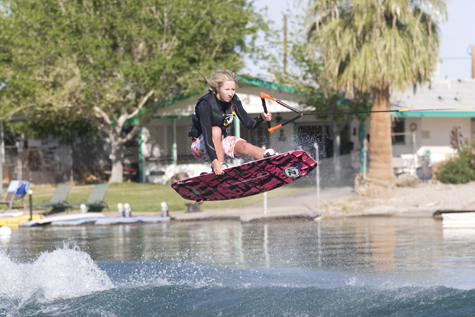
Dual Dexterity
Local professional wakeboarder Shelby Kantar has talent and smarts
Twenty-four-year-old professional wakeboarder and West Sacramento native Shelby Kantar has led a bit of a double life the past few years. Arguably one of the top female riders out there, Kantar has traveled to compete in contests all around the world. She was the Pro Wakeboarding Tour women’s champion in 2007, she’s been in magazines and videos, she even jumped out of a helicopter into Lake Powell during last year’s Brostock event. Adventure, excitement, risk and reward: all part of the rock star lifestyle Kantar lives while with her fellow riders.
On the other hand, Kantar is extremely focused on school and furthering her non-wakeboarding-related career. She has already completed her undergrad studies in Kinesiology at Sacramento State, where she is currently working on her masters. “Yeah, it’s like a double life, its kind of crazy,” Kantar says during a recent interview. In fact, when Submerge caught up with her, she was in Redding, working a 40-hour-a-week internship. “It kind of got to the point where I was like, ‘Should I go to grad school or should I do one more year of competing and trying to do well?’” Kantar remembers. “It was kind of like, ‘Well, the girls that are coming up now, their parents buy them a $100,000 boat and they ride four times a day in Orlando and they work out and have personal trainers.’ So I was like, ‘OK, let’s go back to school.’”
Kantar brings up an interesting point. In the world of action sports, there are the “rich kid” sports and the “normal kid” sports. Think about it: to go skateboarding, you need a complete board setup from your local skate shop, which will probably run you around $100, give or take, and that’s about it. To go wakeboarding, you’ve got to have a boat, and those are a whole heck-of-a-lot more expensive. It seems impossible, then, for an up-and-coming wakeboarder to make a name for him or herself if their family isn’t well-off enough to buy the latest MasterCraft X-Star or Malibu Wakesetter, right? Wrong. Kantar is a perfect example. When she was 14, her parents bought a boat, but not a flashy, expensive wakeboarding boat that you’d see in magazines; they got a run-of-the mill family vacation-style boat and it was behind that that Kantar was introduced to wakeboarding.
“The only way that I got to ride behind a good boat was because I met someone who was well-off and had one,” she says. “They’d take me out and I’d just pay gas money.” Either that, or she’d hang out on a dock or near the river with her board in hand, waiting for someone to give her a pull. “We would walk down to the river and skim board,” remembers Kantar of her earlier days in West Sacramento. “I would just bring my wakeboard, and I met so many random people that way. I had nothing else to do, and I wanted to get better.”
Kantar started competing in Northern California competitions. Not long after, sponsors came knocking. Now, some of the biggest companies in the world back this local ripper: Liquid Force, Body Glove and Osiris, just to name a few. She has competed at the professional level not only throughout our own country, but also abroad in Egypt, Singapore, Qatar and Australia. Her favorite competition of them all? She claims the Egypt World Cup, even though it was a bit of a flop. “That contest was probably the most fun, because they kind of messed up and didn’t check out the site that they were going to throw it at. It ended up being like in the ocean with waves and the boat hit coral and couldn’t drive the contest,” Kantar remembers with a laugh. So, they found a little pond, rounded up a jet ski to pull the riders and made some makeshift obstacles for them to hit. “They found these galvanized steel posts like on the side of the road and they made a little rail. It was so sketchy, but they ended up splitting all the prize money, and I just drank beer and hit these sketchy rails,” she says, adding, “And I got to see the pyramids!”
This sums up Kantar’s laid-back outlook on contests quite well. Even though she’s done well in them in the past, placing 3rd in the 2007 Wake Games, 2nd in the 2008 Egypt World Cup, 2nd in the 2008 Singapore World Cup, 3rd in the 2008 Qatar World Cup and 2nd in the 2008 U.S. Nationals, she’d rather be out with her friends shooting for a magazine or a video spot any day. “Contests are such a joke,” she admits. “The expectations are kind of ridiculous.”
For the past year or so, Kantar hasn’t been competing, but that doesn’t mean she hasn’t been progressing. “I’ve been having a ton of fun just improving my style, making tricks look better, learning tricks that I want to do, not necessarily what will win me a contest.” She says she and her friends like fellow Liquid Force teammate Danni Petraitis (with whom Kantar was living while up in Redding), would rather stay and film on Lake Shasta or go on a cool trip to ride rather than “sitting around a contest all day and getting like a two-minute pull.”
Kantar’s about to reap the benefits of some of her hard work when Body Glove drops their first ever wakeboard video titled Slick City, in which she is the only female rider. Slick City will be available for world-wide purchase starting July 7, 2010 through action sports media giant VAS Entertainment. The DVD will be available for purchase at local wakeboarding shops and for download on iTunes shortly after. The video has already earned rave reviews from people at Wakeboarding and Alliance, the industry’s two largest publications, making Slick City one of the most highly anticipated wakeboard films of the year. The film follows some of the biggest names in the sport: Rusty Malinoski, Harley Clifford, Bob Soven, Jeff McKee, James Balzer, Daniel Doud (Kantar’s boyfriend) and of course, Shelby Kantar.
“I didn’t really get to film as much as I wanted to for that, especially my wake section,” she says, noting that since Body Glove is such a large, global company, coordinating the video shoots was hard. She did get a lot of footage sliding rails, though, an aspect of the sport that she is particularly good at and likes. “We built some rails and got quite a bit of rail footage. I really like riding rails, so I’m glad we got that, but as far as my wake riding, I wish I could have done a little bit more for that video.” Regardless, appearing in Slick City will surely introduce a whole lot of people to the style and charm of one of Sacramento’s best-kept secrets.
Kantar has another year and a half of graduate school, after which she plans on buying herself the nice wakeboarding boat she never had when trying to come up in the industry. “I kind of wanted to set myself up to have a normal career so that I can afford all this stuff and I can just free-ride, maybe do some more shooting even though I’ll be pretty old by then,” jokes the young, bubbly Kantar. “The girls that are competing and coming up now are so young, I feel pretty old, as sad as that is.” Contests or no contests, old or not old, Kantar says one thing is for certain: “I’m going to get my Malibu boat, and I’m going to shred.”
Body Glove’s wakeboard film, Slick City, featuring local Shelby Kantar will be available July 7. Kantar can also be found coaching lessons at the Delta Wakeboard Camp.
Fires in Brazil
Friendly Fires start a burning groove with Samba and”¦R&B?
Friendly Fires are tapping into an energy that has turned entire cities into dance floors. The samba rhythms of Brazil have long been important to music culture, most notably having a monumental influence on jazz. But the boys from St. Albans, United Kingdom, aren’t hangin’ with the “Girl from Ipanema.” Friendly Fires have borrowed from this rich genre of music and have crafted a sound that is at first pop music with an electro edge but when explored exhibits complex polyrhythms and well thought out lyricism. A song like their new single “Kiss of Life” is a prime example of their efforts in full swing.
“On ‘Kiss of Life’ we based it around that kind of rhythm and a couple of samples,” says drummer Jack Savidge. “We got the feedback guitar and the samba group in to play with us. We kind of pushed it.”
The Mercury Prize nominated band released a few singles independently, including their hit “Paris” before they were signed to XL Recordings in 2008. Since becoming label mates with bands like Radiohead and The White Stripes, the pace has picked up a bit and a full-length, self-titled debut featuring the critically acclaimed “Jump in the Pool” and “Skeleton Boy” followed shortly. With all the sudden attention, other nominations for various awards started to come their way, which the band took with a grain of salt after the significant but not devastating loss of the coveted Mercury Prize.
“It genuinely doesn’t really mean that much,” explains Savidge. “I mean, if we’d won the Mercury Prize it would be a big thing for us. A lot of the others, it genuinely isn’t a big thing.”
Currently on tour with the painfully hip The xx, Friendly Fires will be crossing the Atlantic to finish off an extensive tour here in the States. The last time they were here was 2008, supporting Lykke Li and only coming as close as The Independent in San Francisco. This time around, they’re the main attraction.
“I think it will be good. It’s our first proper headline tour in the United States,” says Savidge.
You can catch them live at Sacramento State on Nov. 24 inside the University Ballroom, where dancing will no doubt ensue. Submerge caught up with drummer Jack Savidge as the band was preparing to play a show they helped organize called The Warehouse Project in Manchester.
You guys are almost at a point where you think it’s not going to happen for you, you start off recording songs in a garage, you make limited edition pressings of your music and then all of a sudden you’re on tour with Crystal Castles and then Interpol and after that signed to XL and are now label mates with Radiohead! Has the past couple years been a little overwhelming?
When we were recording the songs in the garage, there was never any fearing that, oh no things aren’t going well. Because as a band starting out, it’s always amazing to have a record of your music. That’s always been amazing for us. So, it wasn’t really like, “Oh no,” we’re just doing this thing and then all of a sudden it was a whirlwind. It seems to have grown kind of gradually. It’s kept on growing and growing and we’ve been touring pretty much relentlessly for the last couple of years. So I guess now we’re seeing the fruits of that. It’s always strange as a music fan, going into HMV and seeing your CD there and to read magazines that you’ve read since you were a teenager and read about yourself. Or seeing a TV program that you videoed as a teenager religiously and then you’re on them. It’s weird. We’re all sort of music obsessive, nerdy types. You can get really blasé about it because it just becomes another thing in the day that you’re going to do. Say, playing a big show or playing a festival. You do kind of get a sense of, look how far we’ve come. We’re doing these things that I dreamed of doing.
I watched your hi-tech Flip behind the scenes footage on the Web site, and it looks like the three of you genuinely get along really well. Is the songwriting process as agreeable?
Yeah, generally. There’s the occasional disagreement, but I think there have been a couple things that have been slight sticking points. Obviously it’s not all white and rosy. But it’s quite easy to, if there is a disagreement, it’s quite easy to just have a deep breath and then get on with it. The mood never gets too dark, even though there are differences of opinion. That’s important for a working relationship. Everyone has their opinions, but I suppose we spend so much time together that it’s either get on well with each other or just have a horrible time all the time. I think we’d rather just get along well with each other.
There’s a lot of emphasis on percussion in your songs. The new single “Kiss of Life” is a Brazilian rhythm, which I know is big inspiration for you guys. What is the layering process like? Do you have a percussive groove that leads the idea or do all the bells and whistles come later?
I’d say, usually beforehand. We generally work on songs from the bottom up. We get something that sounds—some kind of drums and bass groove that sounds good. You know, the mapping out of it all. What might be the verse, what might be the chorus. We tend to add a lot from there. Because of how we write, which is generally ideas go straight into the computer and then we can layer things up like that, rather than if we were working everything out in the mode of a live band. But we’d only be able to imagine half as many songs as there are hands able to play them at one time. As we work on the computer there’s a lot of room to put down loads of percussion and make something sound like a really big rhythm section before vocals get even thought about. We try to do as much to an instrumental track as we can and then usually it leads the way to adding vocals on top. I think it’s kind of helpful to him [Ed MacFarlane, vocalist] to have a vibe there and the percussion definitely helps that. It’s always an atmosphere thing—the percussion. You can get the impression of a lot of energy by building up those layers. That informs the rest of the song.
What is it about the Brazilian samba that interests you so much?
It’s just really exciting sounding music, because it’s so percussive and so intricate. It’s always going to sound really exciting. I think there’s a theme to that. It almost found us by accident, because look at “Jump in the Pool”: almost by accident that had a slight kind of a samba feel. Although that was never what we were actually aiming for, it just ended up like that. I guess it found us. Actually the stuff we’ve been doing recently, there hasn’t been an awful lot of songs that sound very Samba or anything.
What’s the new stuff starting to sound like?
It’s pretty varied, actually. We always want it to be varied. There’s one song that sounds a bit like R. Kelly or something.
Like “Trapped in the Closet?”
No [laughs]. More like “Vibe”-era R. Kelly; like Dangerous-era Michael Jackson. The sort of”¦ Is it new jack swing? I guess it’s new jack swing.
That ’90s R&B sound?
Yeah, yeah. But a bit more upbeat. I guess the ’90s were on Timbaland and stuff, who pushed it a bit more sparse and a bit slower and a bit weirder. But yeah, I think we’re vibing off the early ’90s stuff. There’s some quite groovy ones using a lot of”¦vaguely afro-y. But I don’t want to say that because everyone will think we’re going all Vampire Weekend or something. Actually, we’ve got three ballads on the go. We’ve never really had a very slow—I guess “Strobe” is quite slow; we’ve never really had very slow, lighters in the air songs. So maybe there’ll be a few of those on the next album.
I think what sets you guys apart from similar bands is the content in the lyrics. They’re not these hollow songs with a catchy hook. They have the hook but there’s an emotional edge to each song. Are the lyrics strictly Ed MacFarlane’s or does everybody contribute to the lyrical content?
Ed generally does all the lyrics. But we’ve done a couple of things all together like “On Board” we wrote together. Bits of “Jump in the Pool,” the chorus was a group effort. But Ed generally does it. I think it’s fair enough, because he’s the one who sings it night after night. He may as well believe in it.
It seems as though all these awards have overshadowed you guys, particularly your loss of the Mercury Prize. You joke on your Web site about not losing much sleep over these things, but it has to mean something to you to be nominated. Does it matter really? Or are you already jaded by awards?
I think genuinely, not in a kind of snotty way, but we’re generally not that bothered really. The first few times you’re nominated for an award, it’s really exciting. You get to dress up in some smart clothes and then go and have dinner and spot loads of famous people. Get really drunk on the wine that endlessly turns up at your table. After you’ve done it, you’ve kind of done it. I think for us the Mercury Prize was pretty special, because it’s one of those things that you grow up hearing about and you’re interested in. I remember when I was a teenager there being all this hype about it and who’s going to win; who your money is on. It’s a big talking point. About the others—it’s really nice to be nominated.
Friendly Fires will played alongside The xx at the University Union Ballroom on the campus of Sacramento State on Nov. 24, 2009.
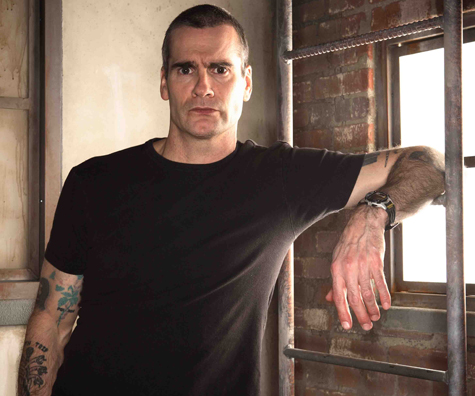
Real Talk : Unlikely Renaissance Man, Henry Rollin
Unlikely Renaissance Man, Henry Rollins
It might be easier to list the things Henry Rollins hasn’t done. Let’s see: he hasn’t won the Super Bowl, hasn’t received a Nobel Prize (yet), hasn’t, and apparently never will, run for president. Other than that, Rollins has, over the course of the last three decades, done pretty much everything else. Frontman for seminal punk band Black Flag? Check. World-renowned spoken word artist? Check. Major motion picture actor? Check. Television host? Check. Radio host? Check. Author? Check. Activist, philanthropist, on-stage pugilist? Check, check and check.
Through it all, however, Rollins has maintained the same tireless work ethic—not to mention the imposing physical presence—that took him from his self-described humble roots to being one of the more recognizable faces in entertainment. With a recently announced role on the second season of Showtime’s Sons of Anarchy and an upcoming spoken word date at Sacramento State, we caught up with Rollins via e-mail, where we learned, among other things, that humor doesn’t translate well digitally. And, that no one fucks with Henry Rollins. Ever.
Would you agree that a certain segment of the population knows you these days more as an actor/television personality/talking head than as a musician? What are the differences between those lifestyles, other than being able to afford to eat?
I can’t possibly tell you what percentage of people who know me know me from what. I do get a lot of people telling me they saw me on TV or in a film but it seems to be as much as people saying they liked that song or whatever. I only have one lifestyle. I work and that’s about it. Everything in my life is about the work pretty much. In that, it’s all the same: deadlines, obligation, performance, etc.
On the new season of Showtime’s Sons of Anarchy you play a violent neo-Nazi. Besides getting a bunch of tattoos, getting super physically fit and shaving your head, how did you prepare for this role?
I already had the tattoos and was in shape. I got a slight haircut, but that was about it, prep-wise.
All joking aside, as someone who is so outspoken against racism, was it a stretch to play such a vile character? Or is he something of a sympathetic figure, a nice guy at heart?
The guy has no redeeming qualities besides doing what he’s told. It wasn’t a stretch to play the part, though.ÂÂ
You’re coming through Sacramento next month, home to celebrity-turned-governor Arnold Schwarzenegger. Do you have any political ambitions of your own?
None.
What’s your take on the current health care debate? What’s your take on the current state of politics in general?
I think that people in America would be better off if they didn’t have to lose everything because they get cancer. I think if you have a for profit healthcare system, then you make your money by denying care, basically what those who do that are accusing others of doing. I think you have a country with systems and priorities that need an overhaul. The overhaul would require big business to have a slightly humanitarian pulse, so you know it won’t happen.
What can people expect from your upcoming spoken word set?
I’ll be talking about where I’ve been recently and what I got from all the miles.
Where have you been recently?
Iran, Syria, Lebanon, Pakistan, Burma, Cambodia, Laos, Vietnam, South Africa, Mali.
How do you think you’ve been able to consistently reinvent yourself, while (at least seemingly) remaining true to who you are?
I follow my interests so I am always interested and into what I’m doing.
I come from nothing much so it’s all pretty interesting to me.
To that end, what’s next for Henry Rollins?
I will be traveling all over the world up until tour starts in mid January 2010.
What tour is that?
I will be out for several months, all over the world, doing speaking dates.
2012: Apocalypse or bullshit?
I don’t know what you mean. I don’t think Obama has a lock on a second term by any stretch. I don’t see anything getting much better from now until then. I think some people want it that way.
Who, in particular, do you mean?
If you sell bullets, peace is your problem. If you sell oil, alternative fuel sources are your problems. If you sell goods to prisons, or build them, a drop in crime is a problem. If you build jets or missiles or bombs, progress, negotiation and goodwill are your enemies. If you embrace the Prison Industrial Complex or the Military Industrial Complex, education, literacy and equality are your enemies. If you sell drugs, healthy people are your enemy. If you are Visa, people who pay on time are your enemy. That’s what I mean.
Any good recommendations as far as books, music, food, places to go, shit to see?
Eamon Fingleton’s book In The Jaws of the Dragon was an interesting read to me at least. It’s about Chinese-American relations. The new Horrors album Primary Colours is really cool; Pray the Devil Back to Hell is a good documentary I saw recently. And I reckon every American should go to at least three African countries.
What do you think that the average American would get out of spending time in Africa?
Perhaps a better understanding of what valuable resources food and water are. What we waste in food and water could feed hundreds of thousands of people.
Henry Rollins will no doubt be more vocal at his upcoming speaking engagement at Sacramento State’s University Union Ballroom on Thursday, Sept. 17. This free event starts at 7:30 p.m.
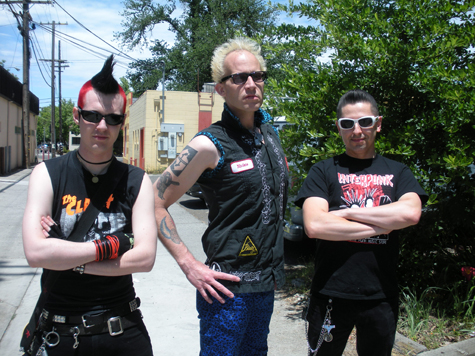
Showing No Signs of Slowing
Sacramento Punk Legends The Secretions Are Set to Release New Record
The year was 1991. The grunge movement, in all its flannel glory, had fully engulfed the country thanks to bands like Nirvana and Pearl Jam; the Governator was just the Terminator in Terminator 2: Judgment Day; Will Smith was just the Fresh Prince in The Fresh Prince of Bel-Air; and two young punk rockers attending Sacramento State, Mickie Rat and Danny Secretion, would meet and form a band. “I would have to walk through the University Union and I would get my coffee and go to class and I would always see this guy wearing all black no matter how hot it was,” Danny recalls of Mickie Rat during a recent conversation outside Benny’s Bar and Grill. “Long-sleeve black shirt, black pants and motorcycle boots with these big metal plates on the front and he had kind of a Mohawk devil-lock. It was pretty awesome.”
Mickie was aware of his intimidating appearance and even admits that he was known as the “scary punk guy” around campus. The two would see each other often, but never really spoke until their paths crossed one afternoon under dreary circumstances. “We actually started talking at a funeral,” says Mickie, who at this point had already started a band. “Our original guitarist was the program director for the student-run radio and he passed away. I had seen [Danny] in the studio; we had shows near each other. We didn’t even really start talking until then,” says Mickie.
One thing led to another, Danny was invited to jam and The Secretions were born. “We still have cassette tapes of those practices and how we started every song with, ‘One, two, three, four!'” Danny says.”
The two recall that in those first days of practice, ending the songs in sync was not as easy as starting them. “Usually we would start out the song together but the ending would always end up disintegrating,” remembers Danny. “The guitar would stop, then the bass, then the drummer would just keep playing.”
Fast-forward 18 years and the two are still making punk rock music together. “We don’t know how to do anything else,” says Danny. “I think the thing that’s really helped attribute to us not throwing in the towel is coming to grips with the fact that we’re not going to be huge and famous.”
Money and fame aside, The Secretions are a very successful band. They’ve toured the country many times and released a handful of records, but more importantly, they’re great friends who love playing music together. “My goal was to always be in a band with friends,” says Mickie. “That’s pretty much what it’s always been about for me. I’ve been lucky enough to do that. I mean, some people are like, ‘Oh I’ll hire a bunch of guys to play my music.’ That’s never worked for me.”
What has worked for The Secretions for nearly two decades now is booking smart tours: Gigging every other month as opposed to every weekend to avoid over-saturating the market; recording and releasing high energy, addictive punk rock records; and connecting with their dedicated fans, appropriately dubbed Secretins, more deeply than most groups these days. The band—which currently consists of Mickie Rat (bass, vocals), Danny Secretion (drums, vocals) and Paul Filthy (guitar, vocals)—truly has withstood the test of time. With a new record, entitled GREASYHOTMEATCHEEZY, due out in July, a slew of tour dates including two appearances at the Insubordination Fest in Baltimore, Md. in late June, two Sacramento release shows (July 3 at the Blue Lamp and July 20 at the Boardwalk) and a two-week West Coast run with The Bugs, they are not showing any signs of slowing.
Where did the name GREASYHOTMEATCHEEZY come from?
Mickie Rat: Paul’s girlfriend.
Danny Secretion: We were driving to Fresno to play a show; it was like a Friday night so we had all just gotten off work, went home, cleaned up, drove around and picked up everyone. We pulled over to get some gas and something to eat and I just asked, “What do you guys feel like eating?” And she just blurted out, “Greasy, hot, meat, cheesy!” It was just one of those things. On the inside of our van there is just Sharpie tags all over and written up there is “GREASYHOTMEATCHEEZY” and we just circled it and were like, “That’s a great album.”
MR: It’s a running joke, somebody will say something disgusting and you’ll be like, “Oh that’s what our next album is going to be called.” She also kind of did that to goof on me because I’m a vegetarian and I’m allergic to dairy so she was like, “Hm, what are all the things you can’t eat?”
DS: Yeah, Mickie can’t eat too many things that are meaty or cheesy.
MR: But I like hot things and greasy things.
What else can you tell me about the record? How does it compare to past releases musically and lyrically?
DS: Musically I think it’s on par with everything else that we’ve done, it’s nothing too complicated.
MR: I think a lot of people are shocked because I’m more singing than yelling. There’s some different songs. Usually if I write a pop-y song that sounds kind of smoother and I sing kind of pretty on it, I’ll save it and not put it on the album. I’m getting to the age where you just stop giving a shit. A lot of those songs I didn’t want on the album, but then I was like, “Eh, what the fuck do I got to lose? Let’s just put them out there.” The opening track is like three-and-a-half minutes long, which is like the longest song I’ve ever written.
Yeah, that’s like three normal Secretions songs!
MR: Usually I write stuff that’s a minute-15, that’s like my average song length. I kind of wanted to write this rockin’ Joan Jett and the Blackhearts kind of song.
DS: It’s a fun song. That was the big risk that we took was putting a song that was so different from the others at the beginning.
MR: Yeah I really didn’t want to put it first either but eventually they convinced me.
DS: We were just like, “No, this one has to start it.” It’s one of those things where it’s going to make people listen to it. The next song is just classic punk all the way through.
MR: There’s some different kind of stuff on this one.
DS: It’s just a fun album. We’ve got the songs pretty much telling off certain people. That’s always been what we do, just kind of poking fun at people.
MR: It’s what we do best: pissed off punk rock.
You’re doing a listening party at Capitol Dawg. Whose idea was that?
DS: That was Mickie’s idea.
MR: It’s one of my favorite places to eat. I always hang out and talk to the owner. My girlfriend and I actually went there for the first couple of weeks and nagged the hell out of him to get garlic fries because he didn’t have them yet.
So I have you to thank for my stinky breath after I eat those, eh?
DS: The reason why he didn’t have them was really cool. He didn’t want to do garlic fries, because Jack’s next door had garlic fries and he didn’t want to disrespect them.
MR: But Jack’s has terrible fries, the only reason they are good is if they put garlic on them. A fry must stand alone, by itself, before you put anything on it. I am a total fry aficionado. If a fry doesn’t taste good with nothing on it then I don’t want to eat it.
You guys have a widely renown connection with your fans, a listening party seems like a good way to keep that strong. Have you done anything like this before?
DS: We did it last year at the Javalounge. I think prior to that it had been much more informal, maybe just inviting friends over to our house to get drunk and play our new CD. For Faster Than the Speed of Drunk we did something a little more formal, we had an actual listening party where we told everyone to come on over to the Javalounge and we played the CD. This year we thought about doing it again and Mickie had the idea of doing it at Capitol Dawg.
MR: We’re going to have a special hot dog recipe for the evening; it’s going to be the “Greasy, hot, meat, cheesy.” I somehow convinced the owner to do the 88-cent Pabst long necks for that night. He usually only does that on Mondays, but he’s agreed to extend it to a Thursday.
DS: Oh, that could be bad news for us!
What is this Insubordination Fest all about? Are you pumped to be a part of it?
DS: It’s a big festival, I think this is the third one; it’s basically Lookout Records mid-’90s: bands like the Mr. T Experience, The Queers and The Parasites. They just have this huge festival with all these pop-punk bands back East.
MR: It’s put on by Insubordination Records.
DS: This year the surviving members of The Dead Milkmen are going to reunite and play. Lots of other huge bands will be there. We play on the Friday night just as the Secretions. Then on Saturday we’re backing Wimpy Rutherford, who is the original singer for the Queers, so we’re going to be doing like all the old Queers songs.
That seems like kind of a big deal for you guys!
MR: It’s a huge deal.
DS: It was one of those things where I was talking to Wimpy about the possibility of him playing and us backing him up. I let the guys know, and Mickie didn’t want to get his hopes up.
MR: I was like, “I’m not going to hold my breath.”
DS: Then when we finally got the OK when Wimpy was given a slot and he said, “I want you to be my backing band, learn the songs,” then I let the guys know.
You guys recently did a video shoot for the song “Back in the Day Punk.” Will it include footage from your recent Club Retro show?
DS: Yes, we worked with our friend Rob Young, aka Rob Fatal. He’s a local DJ here in town. He’s an awesome filmmaker, and he’s absolutely punk rock. He’s very fast about how he films things; he’ll have you do everything about five times until he gets what he thinks is just right and then moves on to the next thing. We filmed the first part during the day at our friend Tom from the No-Goodniks’ house and that was a good time. Then we played at Club Retro later on that night and we played the song three or four times. And he just filmed the kids and filmed us. If you want to get people to really go crazy during your set, put a camera right in their faces. Everyone wanted to be on camera for that. We had a trampoline on-stage for people to jump out into the crowd.
MR: It was for stage diving assistance. In full disclosure, we stole the idea from Sloppy Seconds. It looked like fun.
DS: The first kid to do it was this kid named Tony Silva; he’s from Woodland, Calif. Mickie wrote a song about this kid because he’s from Woodland but he takes the bus, because he doesn’t have his drivers license yet, to Sacramento to go see punk shows. So all these kids complain about, “There’s nothing to do, this scene sucks.” And you got this kid taking the bus to pay a cover to go see a punk rock show.
What’s the song called that you wrote about him?
MR: It’s called “Tony Silva Rides the Bus.” It’s on our new record. He’s a really nice guy, but he’s kind of a klutz and always ends up hurting himself, you know the bad luck stuff always happens to him.
DS: Well, he was the first one to use the trampoline. I motioned to him with my head as I was playing the drums like, “Tony, go!” So he runs offstage full force, just jumps on the trampoline, soars into the air and the crowd parts like the Red Sea. He had gotten so far out he didn’t have the time to level out so he could land feet first, so he pretty much did a big elbow drop on the ground. It was captured on video by Rob and we’ll see if it makes it in the video or not.
MR: After our set he comes up to us and was like, “Yeah it kind of hurt, but I got right back up because I didn’t want anyone to think I was a pussy!”
DS: If anyone deserves a song, it’s Tony. I don’t know if we’re going to be bringing the trampoline to the Boardwalk though, because that’s a pretty tall stage.
Preview The Secretions new record, GREASYHOTMEETCHEEZY, at Capitol Dawg on July 2. Catch them live at the Blue Lamp on July 3 and at the Boardwalk on July 20. For more information visit myspace.com/secretions or secretinlifeline.blogspot.com




